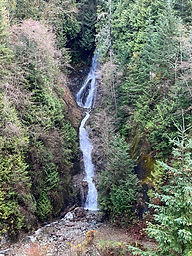Response to hands-on learning has been 'overwhelmingly positive'

Of all the consequences of colonial policies, the loss of Indigenous languages has been among the most terrible. In this region of coastal BC, Skwxwú7mesh Sníchim, the language of the Skwxwú7mesh Úxwumixw (Squamish Nation) has just 12 fluent speakers left.
Knowledge keeper Tsitsáyxemaat Rebecca Duncan is one of the 12 Skwxwú7mesh Sníchim speakers, and she has recently partnered with West Vancouver Memorial Library (WVML) to develop Skw’shítsut/Skw’shétsut - Skwxwú7mesh Sníchim Language Kits.
WVML communications spokesperson Sarah Barton-Bridges notes that the endeavour is part of the library's commitment to reconciliation and to support language preservation.

"Inside the kits, you will find a variety of hands-on, immersive language-learning tools that reflect the culture and oral traditions of the Skwxwú7mesh Sníchim language," she says, in a statement. "There are five available language kits that can each be borrowed for up to three weeks."
Each kit includes a Squamish-English Dictionary that comes with a QR code linked to a talking dictionary, carved alphabet and number blocks, flashcards illustrated with opposites and culturally significant animals, an audio player, a foraging walking guide and a cooperative Stl’ashn Skw’shítsut-Potlatch game.
"These kits are more than just educational resources—they are a crucial part of our collective effort to revive and sustain the Skwxwú7mesh Sníchim language for future generations," said Tsitsáyxemaat. "Our children need to grow up learning and hearing this language and have it be a normal part of their lives. These kits are more than just learning tools—they’re vital to reconnecting our people with their identity.”
Librarian Kendra Sakamoto is the main collaborator with Tsitsáyxemaat on the project, and says community response has been overwhelmingly positive. "People are really excited to explore the kits. There is also a great deal of gratitude, particularly towards Tsitsáyxemaat and her willingness to share her knowledge."
She says there has also been interest from local schools, noting that several classes from local elementary and secondary schools attended the launch celebration.
"Teachers are eager to use the kits with their classes and administrators are interested in using the materials for staff Professional Development," said Sakamoto, adding that a complete kit was presented to Xwemélch’stn Etsimxwawtxw/Capilano Little Ones School.
She sees programs such as this as a pivotal part of Truth and Reconciliation efforts. "Providing access to Indigenous materials and programming allows non-Indigenous people to learn about the centuries of colonial policies designed to erase Indigenous People."
She adds that it equally important to present Indigenous people in the present tense. "They are entrepreneurs, activists, authors, artists, land healers, knowledge keepers, and so much more and this should be highlighted and celebrated. Indigenizing public spaces and relationship building is also an important part of creating welcoming and inclusive libraries."
WVML Board Chair Tracey Wachmann expressed her gratitude to Tsitsáyxemaat for her willingness to share her knowledge of the Sḵwx̱wú7mesh language. “For the library, this has been an incredibly meaningful collaboration. Supporting language preservation and recognizing the cultural importance of language is one of the Library’s responses to the United Nations Declaration on the Rights of Indigenous Peoples and the Truth and Reconciliation Commission of Canada’s Calls to Action.”
The language kits have been funded by the province of British Columbia through the Ministry of Municipal Affairs, and can be reserved online HERE.
The Watershed values your thoughts.
Leave your comments below,
or email us at editor@lionsbaywatershed.ca
Like what you're reading? For as little as $5/month,
you can support local independent journalism
by subscribing to The Watershed HERE.






Comments